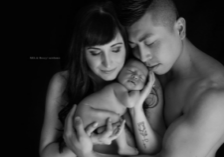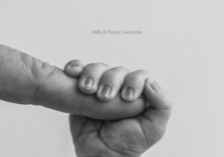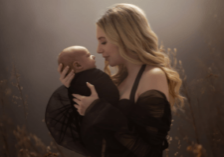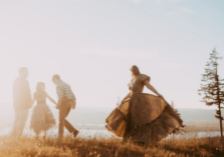The Fearless Photographer: Your Art, Your Way with Bobbi Barbarich
Humans in general have a lot of limiting beliefs, but as photographers, so many doubts come into play. We’re unsure about our art, we doubt our value, we undercharge and overwork ourselves. It’s not healthy and it needs to change.
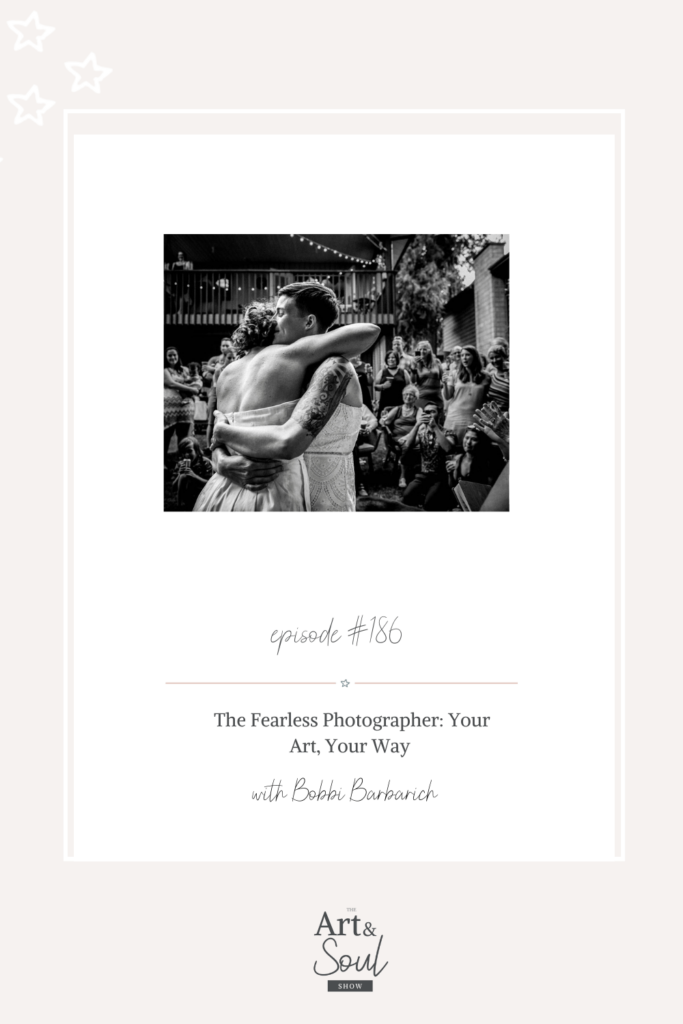
In today’s episode, I’m interviewing Bobbi Barbarich, a documentary wedding and family photographer. She shares how to find your voice as a photographer, what to do when you feel stuck, and how to uncover what’s holding you back in your photography.
We also chat about how to stop self-sabotaging behaviors such as procrastination and how fear plays into it all.
What’s in this episode:
- [02:59] Bobbi shares why she’s so passionate about documentary photography and how she found her voice as a photographer
- [12:49] How Bobbi found herself in photography coaching and her advice on what to do if you’re feeling stuck as a photographer
- [23:09] Bobbi explains what shoot shadowing is and why it’s so important to growth
- [30:28] How to uncover what’s really holding you back as a photographer, and why there’s a limiting belief behind raising your rates
- [39:20] How to stop self-sabotaging behaviors like procrastination
Tune in to this episode for how to find your voice as a photographer and get unstuck.
SUBSCRIBE: Apple Podcasts | Spotify
Want to put an end to awkward moments in your photo sessions and create genuine connection? Download The Storyteller’s Toolkit today, featuring 200+ emotive photography prompts, so you’re never left wondering what to say.
Resources Mentioned
Book: The Mountain is You by Brianna Wiest
Meet Bobbi
Bobbi Barbarich has been a documentary wedding and family photographer for 12 years, winning dozens of awards for her irreverent take on traditions and seeing the magic in the mundane. Her podcast, The Tilt and Shift Photography Podcast, digs deep into the moment it clicks, when our perspective shifts and we can no longer continue on the same path. She guides listeners to use these stories to build a better, more confident business. And Bobbi’s coaching experience runs the gamut from luxury photographers with KT Merry Education to wayward teens through the nonprofit adventure company Girl in the Wild. She’s based in Nelson, B.C.
Connect with Bobbi
Listen to The Tilt and Shift Photography Podcast
Follow The Tilt and Shift Photography Podcast on Instagram
Did this episode inspire you to find your voice as a photographer and get unstuck? Check out this episode Finding Your Voice with Caroline Jensen that offers you even more insight on finding alignment in your business!
Transcript
[00:00:00] Bobbi Barbarich So oftentimes people feel stuck. They’re looking for like a hand or a life preserver or some sort of like do this. But what it really is, is helping them to be able to choose courage over fear. So often we’re stuck because we fear something. And usually what we fear is change. Doing something differently, we know that if you’re feeling stuck, it’s because you are. And it’s because you’re scared of changing. More than likely, I would say 90% of the time that’s what’s happening. And we often do things that we don’t enjoy or don’t align with us because of fear. And whether that is fear that we won’t be accepted or that our work won’t be liked, or fear that we won’t be able to pay the bills if we don’t do what we see everybody else doing who we assume are paying the bills. And also like if we don’t necessarily know where our alignment is. So those those are all things that will keep us really stuck.
[00:01:04] Lisa DiGeso Welcome to the Art and Soul Show where we dive into heart opening chats on photography, business, life and that messy in between. I’m your host, Lisa DiGeso, a mom, a photographer and entrepreneur, and I’ll be sharing honest conversations and advice for photographers with insight on mindset, entrepreneurship and creativity. The goal of this podcast is for you to be able to gain insights and strategies that will get you real results. Because let’s face it, having a photography business can be lonely, but it doesn’t have to be. This is the place you can go when you need a boost of encouragement, a kick in the pants and inspiration to pick up your camera. This is the Art and Soul Show. Hello, my beautiful friends. Welcome back to the show today. I’m super excited to dive into today’s conversation with Bobbi Barbarich. Bobbi has been a documentary wedding and family photographer for 12 years, winning dozens of awards for her irreverent take on traditions and seeing the magic in the mundane. Her podcast, The Tilt and Shift Photography Podcast, digs deep into the moment. It clicks when our perspective shifts and we can no longer continue on the same path. She guides the stars to use these stories to build a better, more confident business. And Bobbi’s coaching experience that runs the gamut from luxury photographers with Katie Marie education to wayward teens through the nonprofit adventure company Girl in the Wild. And she’s based in Nelson, B.C., which is like 5 hours away from me, which is pretty damn cool. I am so excited to dive into today’s conversation without further ado. Welcome, Bobbi.
[00:02:41] Bobbi Barbarich Hi, Lisa.
[00:02:43] Lisa DiGeso I think I’m laughing so hard already. Like we just met, like, 5 minutes ago, so this is awesome.
[00:02:52] Bobbi Barbarich We could have just met in the middle and just had coffee and done.
[00:02:59] Lisa DiGeso Right. Meet you in Summerland. So tell us who you are and what you’re really, really passionate about.
[00:03:02] Bobbi Barbarich Well, as you said in the intro, I’m a documentary wedding photographer and I am deeply passionate about the documentary element of that because I. Okay. We’re going to dive in deep immediately. My life legacy is I want to leave this world having helped people to eradicate their self-loathing.
[00:03:32] Lisa DiGeso Yes.
[00:03:33] Bobbi Barbarich And my tool is documentary photography. Because I believe that if I can show you your life unfiltered and help you see it in the beautiful way that I see you, that it can help to break down some of those walls that we have around ourselves and believing that we have to look a certain way or have to behave a certain way. And I mean, social media makes it a million times worse. But I believe that by putting real photos of real people doing real things it can offer us another perspective or another way to look at a way around that perfection. Yeah. Yeah.
[00:04:16] Lisa DiGeso I love that so much. I think, you know, it’s funny because it reminds me of when you said social media, like I’ve been a photographer, I think, for 13 years now, and it’s been an interesting road. It was started when I had my son. The self-loathing. You hit the nail on the head with that. And especially when it comes to looking at things on Instagram and social media. Like, we went through a renovation and took about five years in our house and I didn’t take any photos in my house of my son during that period because it didn’t look like an Instagram profile.
[00:04:49] Bobbi Barbarich Oh, wow.
[00:04:50] Lisa DiGeso And it kills me. Like there’s a few that I’ve taken that are my most favorite pictures I’ve ever taken of all of the pictures I’ve ever taken when the house was, like, torn apart and my son’s in like a diaper with a life jacket on, getting ready for a fishing trip with his dad. And I just snapped it.
[00:05:07] Bobbi Barbarich Yeah.
[00:05:07] Lisa DiGeso And it just. Like getting over that loathing of perfection, right?
[00:05:13] Bobbi Barbarich Yeah. Yeah. And it’s real. Like, we connect with things that are real. I think we get distracted by things that are not, and that’s what kind of draws us to them. Because our lizard brains want us to be sort of pacified and not thinking too hard. Yeah, you know, but when we peel that away and look at what we actually value and the things that are truly meaningful to us, then it lets go. We can shake it off and actually see like, this is what we look like. But not even so much what you look like. The thing about documentary is that you feel things when you look at it like, Yeah, pretty pictures. We like to look at them, but we don’t necessarily feel them, you know, because of their kind of they can be kind of one dimensional right away, admiring the beauty of something. Yeah, and that’s about it. Right. Whereas if something is like a complex composition and there are people with varying degrees of disheveled it or like emotion or reaction to something, we get to feel all of that stuff that all those people are experiencing. And it’s not about what you look like. Yeah, it’s about what you’re experiencing.
[00:06:32] Lisa DiGeso I love that. And you know, it’s so fascinating too like, we don’t look the same ever. Like, I don’t look the same as I did five years ago or ten years ago or 15 or 30 or 45 years ago. Like we’re constantly evolving and changing. And so having that snapshot of how you felt at that moment is so powerful. It’s not just about that dress that was trendy or like the Botox in your face, like it’s.
[00:06:57] Bobbi Barbarich Crazy.
[00:06:57] Lisa DiGeso Yeah.
[00:06:59] Bobbi Barbarich And by having those real photos taken regularly, we get more accustomed to those changes. You know. My brain still thinks it’s ten years ago. And then when I look in a photo.
[00:07:13] Lisa DiGeso Like I’m 28. Oh, no.
[00:07:17] Bobbi Barbarich But if I was more accustomed and I am this is I mean, it’s something that I’m working on as well. Right. Like, we try to help other people with the things that we help ourselves with. Yeah, I’m getting much more comfortable with this process of aging and the fact that I’m not like I don’t look the way I used to and I shouldn’t like, that’s life, let’s celebrate it rather than avoiding it.
[00:07:38] Lisa DiGeso Yeah, I love that. I love that. So tell me how you found yourself in love with photography and how you discovered your voice as a photographer and now as a photography coach.
[00:07:50] Bobbi Barbarich Well, it was a very long, very circuitous route, so finding my voice was the hardest, the absolute hardest thing for me to do. And it’s why I’m so deeply invested in helping my clients when there’s for sure, like there’s a direct correlation between the fire swamps that I went through and me being like, Hey, this is how you do it.
[00:08:19] Lisa DiGeso Oh, the pit of despair. Yes, I took pride. We are the same. Oh, it is my favorite movie with you. Yes, you are. I’m not sure why you like this. The line we see every night. My husband last night was like. I’ll clean up the kitchen, which now I’m like, Oh, my God, Yes. Okay.
[00:08:48] Bobbi Barbarich So at one point in my life, I had a very sweet boyfriend and he found the script to The Princess Bride on the Internet. And you printed it out and gave it to me. And I was like, Oh, like I was so touched. It was so thoughtful. But I went through and corrected the script based on memory from what I knew of the movie.
[00:09:08] Lisa DiGeso Yes. Oh, my God. You’re like, You guys got it wrong.
[00:09:11] Bobbi Barbarich Yeah.
[00:09:12] Lisa DiGeso That’s actually what happened. Thanks. Virgo. Yes, I am not. But yeah, the fiery attention. Back. Back to the fliers.
[00:09:29] Bobbi Barbarich I just think, like being able to help others, to be able to find that voice and, like, feel confident in it. I’m. My work is all centered around building confidence, because I believe confidence is the tool that we need to be able to do anything that we want. Like, we can ask people for advice. We can like, ask people what to do. But unless you have the confidence to be able to take that information and distill it through your life’s experience and your skills and your gifts, none of it really matters. Like if we’re always asking other people what to do, we’re totally missing out on what we’re actually capable of doing. So.
[00:10:11] Lisa DiGeso Yeah, I love that. And you know, it’s funny, I had a conversation earlier this morning and it we were talking about, like, permission, like, it’s almost like we’re always asking for that permission that it’s okay for us to do something. Yeah. Yeah. Right. And it’s like you just need your own permission. You just need your own. Do you want to do that? Does that feel good? Does that feel right? Is on the line with you? Like.
[00:10:31] Bobbi Barbarich Yeah, I mean, but those are really. Extraordinarily difficult questions.
[00:10:36] Lisa DiGeso Yes.
[00:10:37] Bobbi Barbarich For people who were not in environments that fostered that.
[00:10:41] Lisa DiGeso Completely.
[00:10:42] Bobbi Barbarich Conflict with even some inner child work, for sure. Whether it’s by personality or by your environment or both. If our personalities softer or more exploratory, and then you grow up in an environment that wants you to conform to something and be a certain way and have expectations that totally out of alignment with your soul, you know, and takes courage and exposure to figure out like one that. To have this happen, where has to even question that? And then to go around about seeking answers, you know?
[00:11:19] Lisa DiGeso Yeah. You know, it’s interesting because you hear a lot about, you know, inner child work, but you rarely hear about like, how do you even dive in to your inner child work. So what advice do you have for someone who may be hearing about it but doesn’t even know where to start?
[00:11:33] Bobbi Barbarich Mhm. Okay. I learned about it through my therapist. Yeah. So I would first and foremost recommend like finding a therapist and asking them about it for sure. Now there’s different podcasts and different books in total honesty with kind of blanking on some of the ones that I’ve read. The simple but not easy way that I think about it now is there were a few milestones in my life as a child where things went off the rails. And I can look at that as an adult and be like, Yeah, that was I learned not to trust myself. I learned that my voice was invaluable. I learned these various things. So I like to. Go to that time in my life and give her what she needs. And I do it through visualization. Win, win wins, like my 78 year old wanted to be protected and so I protect her. My 15 year old needed to be heard and I listened to her and things that she wanted. And that’s more or less the basis of it. There’s a variety of modalities around how to do that, but for me, it’s visualizing the place where she needs to be and creating that for her in how I go about the world now.
[00:12:47] Lisa DiGeso I love that. It’s great advice. So how did you find yourself in photography coaching?
[00:12:54] Bobbi Barbarich I think it’s been a natural evolution for sure. I mean, maybe this is in reference to the circuitous route that we didn’t talk about because we went into the firestorm. But this is an excellent metaphor for what we’re talking about. So when I was a little kid, I wanted to be a photographer. I wanted to be a storyteller. Like, I kind of vacillated between writing and photography. Yeah. My parents, they were worried that my life would be really hard if I was an artist. And so they discouraged me from doing that. And the environment I lived in was when I was like, okay, I have to believe what my parents say. Like, that’s an example of not having the self-awareness to understand and have my voice.
[00:13:38] Lisa DiGeso Yeah.
[00:13:39] Bobbi Barbarich So I was like, okay, I can be a teacher. Like, that was just sort of like the the thing, like you can’t write or be a photographer you can maybe teach those things. Or like I could teach English or French. That’s what I went in for. And I got that. I hated it the worst. But I was also really struggling with an eating disorder at the time. And so then I was like, okay, well, I can be a dietitian, so then I can help other people. Even though I was like, deep in the depths of despair, like in the eating disorder. But when you go through things like I just I’ve always had this inclination of going through things and wanting to help other people through the table.
[00:14:16] Lisa DiGeso Yeah.
[00:14:17] Bobbi Barbarich But then when I was doing my master’s in nutrition, I went to night school to become a photographer. So it just ended up coming back. It kept dogging me. And then I was working in academia for a while, and then I’m like, Nope, I’m done. And I moved to Nelson to be a photographer, and I deliberately burnt everything down so that I couldn’t go back like I left the city. I severed all ties. Yeah. And so that I couldn’t go back on myself to go back into that feeling. But then, now that I’ve been doing this for I think I’ve been calling myself a photographer for ten years, but I’ve been doing it for probably 13 or 14. I see myself and other people and I see other people struggling with similar things and I’m like, I want to help. And they really believe in paying it forward. I deeply believe we go through things in order to share the load for someone else.
[00:15:11] Lisa DiGeso Absolutely. Yeah, I love that. I love that. I think so many of us really we struggle with our photography journey at times. And I think you have to kind of go through it in order to learn the lessons from it. And I think that’s like that’s the hard part is don’t even realize it until you’re through it. You’re like Wow, okay. Do not want to do that again. That was bad. Remember, I remember like probably one of my first years I booked a family session on Boxing Day.
[00:15:47] Bobbi Barbarich Well, why wouldn’t you? You’re not working that day.
[00:15:49] Lisa DiGeso I was like, What?
[00:15:51] Bobbi Barbarich They need it, right?
[00:15:52] Lisa DiGeso Yeah, But then I thought it was a family of four.
[00:15:55] Bobbi Barbarich Okay.
[00:15:56] Lisa DiGeso 26 people showed up. Yeah, I didn’t. I didn’t have that in the contract lesson. Didn’t even have contracts. Oh, yeah. So it’s like, it’s so funny, like, all these lessons that you learn and you’re just like, Okay, like, I have so many in the wardrobe of lessons that when you collect them and you’re just like, I love that. And I think, like, I’ve listened to your podcast and I, I just your coaching is phenomenal. I know that you’re probably getting some amazing, amazing transformations for your clients and really, really helping them. So that’s I think it’s just awesome.
[00:16:27] Bobbi Barbarich Super love it.
[00:16:30] Lisa DiGeso So can you talk a little bit about maybe your perspective on when someone is just really feeling stuck and they’re feeling stuck whether like either shooting things that they don’t want to shoot or they’re like just feeling stuck with how much money they’re earning or just generally unhappy. Yeah. What would be your advice on like starting to extract yourself from the pit of despair?
[00:16:51] Bobbi Barbarich What are the three threats in the first one?
[00:16:55] Lisa DiGeso Oh, you asked. The lightning sent. Please.
[00:17:05] Bobbi Barbarich Please everyone who’s listening to this podcast go watch The Princess Bride. It is the most brilliant movie, I think, ever, ever, ever, ever. And always.
[00:17:14] Lisa DiGeso It’s my husband’s favorite, too. Yeah, we love it. Can’t stop.
[00:17:18] Bobbi Barbarich You bested my giant, I mean. You must be exceptionally strong. Yeah, that’s how I feel. Like that’s. I guess that was a joke, but.
[00:17:25] Lisa DiGeso And even when you’re not.
[00:17:29] Bobbi Barbarich No more rhymes. No, I mean it.
[00:17:31] Lisa DiGeso Is this going to get cut? I hope not, because I’d love to rejoin the subtitle of this. God.
[00:17:43] Bobbi Barbarich You know how people when they feel stuck. Okay, so I super love this question because. It’s a deep one. So oftentimes people feel stuck. They’re looking for like a hand or life preserver or some sort of like, do this. Yeah, but. What it really is is helping them to be able to choose courage over fear. So often we’re stuck. Because we fear something. Yeah. And usually what we fear is change. Doing something differently. If you’re feeling stuck it’s because you are and it’s because you’re scared of changing. More than likely, I would say 90% of the time that’s what’s happening. And we often do things that we don’t enjoy or don’t align with us because of fear. And whether that is fear that we won’t be accepted or that our work won’t be liked, or fear that we won’t be able to pay the bills if we don’t do what we see everybody else doing, who we assume are paying the bills and if we don’t necessarily know where our alignment is. So those are all things that will keep us really stuck or in fear of change. And so how to change that is to. It’s to do something different, which sounds so like placating, right? But that is the answer. We have to do something different. So whether that is you change what you’re shooting or you start saying no to the things that you don’t really love. So like, let’s say for the next three months, I’m only going to shoot the things that I love. Let’s just test this out. Any inquiry that comes to me, if it’s something that I don’t super love, I’m just going to say no for the next three months. That will, of course, bring up fears of money or not having enough money. So you would want to be in a position where you felt that you might be comfortable for the next three months. But the cool thing about money is that. If you are clear about what you want and what you’re putting out into the world. When it comes. It does.
[00:19:48] Lisa DiGeso It really is right back. If you are magnetized that.
[00:19:51] Bobbi Barbarich It really does. It really does. And that’s because we’re following I think it’s because that we are we are following why we’re here. We are drawn to things. For certain reasons. And one of those reasons is because that’s what you’re here is you’re supposed to put that out into the world. And when you don’t put it out because you’re scared that you won’t be accepted or that you will pay bills or whatever those fears are. When you put that fear on pause. Yeah, the money will it will come and you will start. Your brain is so beautiful. It starts finding ways for you to adjust your business so that you can make money doing the thing that you love to do. Yeah.
[00:20:34] Lisa DiGeso I once I can remember who originally said it, but for me, if it’s not a hell, yes, it’s a hell no.
[00:20:39] Bobbi Barbarich Yeah.
[00:20:40] Lisa DiGeso Does it give that like, oh yeah, I want to do that or is that like hmm no? And it’s like a lot of the times I like to think of terms and things like, I have to do it or I get to do it.
[00:20:51] Bobbi Barbarich Yeah.
[00:20:52] Lisa DiGeso Right. And when you switch your thinking on like, is it a half you or is it it get to like, how does it feel when you’re like, okay, like I get to do this?
[00:21:00] Bobbi Barbarich Yeah, that’s really good, right?
[00:21:02] Lisa DiGeso That’s not so good. Like, yeah.
[00:21:04] Bobbi Barbarich And also like paying attention to how that feels as this is something different. Clients a lot is if they’re stuck between two options like one is often more logical. Yeah, well, this is what I should do. And side note, if you’re saying should, that’s not what you should do, you.
[00:21:18] Lisa DiGeso Know that that should be on yourself. Exactly. Exactly.
[00:21:24] Bobbi Barbarich But is to envision yourself in one of my therapist did this with me because I’m often I get stuck in that logical brain. Yeah. And I go because of fear, because of scarcity, because of childhood stuff, envisioning yourself doing the two options. So being in the place, envisioning all of your senses, like what you’re hearing, what you are, what you can smell, what you can feel, what you’re wearing. Like what you are experiencing. In that scenario, pay attention to what’s happening in your body is like, Where’s that kind of resonating? Where are you feeling it like a breath, feel a little bit short. Is your heart racing or like what’s happening in your body? And then imagine yourself doing the other thing And what does that feel like in your body? That’s the truth. Our bodies know the truth. You didn’t learn to listen to them. If we give ourselves pause long enough to. Pay attention to how those emotions are being processed physically, then those are beautiful hallmarks to understand what the answer is.
[00:22:27] Lisa DiGeso Yeah, I love that one. One thing I do, like when I get really stuck on making a decision, is I do the coin flip and it’s not the answer of like, what is the coin? It’s like, how do I feel in the center? What’s happening? Where am I leaning? In the center. Like, am I hoping its heads because of this or I’m hoping it fails because that’s then. Then my answer, it doesn’t matter what it where it lands, it matters right here. And then I know that that’s what my heart wants.
[00:22:53] Bobbi Barbarich Yeah. Yeah. Again? Yeah. If you’re disappointed that it lands on heads. Yeah, well, it’s obvious then obviously that.
[00:22:59] Lisa DiGeso Yeah. Yeah.
[00:23:00] Bobbi Barbarich Exactly. That’s a good one. That’s a good quickly to do it right.
[00:23:03] Lisa DiGeso It’s just like. It’s like that internal litmus of like.
[00:23:06] Bobbi Barbarich Yeah. Yeah. Very good. I’m going to.
[00:23:09] Lisa DiGeso Do love it. So when I was listening to your podcast, I learned about shoot shadowing. And I loved you this phrase when I heard it. So can you share with our listeners what it is and why it’s so important to growth?
[00:23:22] Bobbi Barbarich Yeah, thank you for asking this question, because it’s my take on photo critiques. Yeah. Yes. And so shoot shadowing. And it has a critique kind of element. But I think we kind of get a little bit scared by the word critique because I’m going to be criticized and that’s not at all what happens. It’s this kind of supportive journey through one of your Lightroom catalogs. Yeah, unculled, unedited. Just you. Kind of naked. I make a joke about Granny underpants in one of my podcasts, I talk about, you know, you’re wearing, like, your ugliest underwear, and we’re going to go through your Lightroom catalog together. And what it does is it allows me to kind of get into your head and I can see where you’re positioning yourself, what you’re thinking. I can even kind of feel, especially if someone being hesitant or if they’re trying, if they’re sitting somewhere maybe a little bit too long or they’re not quite where they need to be to to really feel the moment, especially in documentary photography, it’s how you immerse yourself in the environment is immediately evident in how you’re able to tell that story in an imagery. So if there’s like distracting elements or if there’s distance between you and the subject, or if you just take one frame instead of five, like when, when there’s a movement. So it really allows me to like, get in there with you. And then we talk about, okay, how are you feeling? What were you thinking? Like, Oh God, I was so bored or I don’t know what the hell I was doing or like, Oh, I saw this. And I was really hoping something would happen in this light. Then we can talk about strategies of how to make this a more clear picture because we really get stuck in our heads and we really fall in love with our own images, right? Yeah. And we when we’re editing, we have context. We’ve given ourself context because we were there. But if you have to explain a photo to someone and why you like it, then that photo could have been a little bit better. We could have found a way to tell a more meaningful or a more clear story. So when we go through your catalog together, I come in with this objective perspective. I don’t know any of these people or what’s going on. But I can see where the story is. And then we can talk about, okay, here’s how we could have gotten there. Or amazing. Look at what you did. Look what you pulled out of this and look what we can see. So it’s having people objectively look at your work is so helpful to helping you become a better photographer and feeling really good about your work. Because, yes, we have to love our work. And it’s super helpful if the work that we’re putting out there is understood. Or if it resonates and it sometimes doesn’t resonate because we’re standing in our own way. Yes. Whether it that’s because of we are not getting into the right spot at the right time where like, we’re not anticipating a moment or things like that. So we it’s just a super supportive, inquisitive, curious way to look at how you move through a shoot and how we can help you to be a better storyteller. I love what you doing. Yeah.
[00:26:28] Lisa DiGeso Do you go through like, do they pre-cull anything? Because I’d be so curious to know, like the ones that they chose and the ones that you choose, would they be similar and different and why?
[00:26:38] Bobbi Barbarich It’s really funny because sometimes they’re not. And often a lot of times other people say, your work is like, I didn’t even see that. Like, not only am I looking through your eyes, but you get to look through mine as well. Like, I didn’t even think about that. Or like, what if we crop it here and then the message is so much more concise or it’s more like direct. The whole point of it is to be able to have other eyes on what’s going on in them that can help you to refine your work. When you’re young, people go to art school, they go through tons of critique, right? It’s a skill you have to learn to be able to not take it personally. I talk a lot on my podcast about not taking things personally, and one of the ways to do that is by having your work critiqued, but it also develops confidence, right? Because you’re like, Oh, okay, this is something I can work on. This is something I’m doing really well. This is something that I can bring to my shoot and I can have like dedicated practice on anticipating a moment or composition or whatever it happens to be.
[00:27:33] Lisa DiGeso Totally like the biggest gains. I think when I was first learning like this was back when photographer forums were all around. Yeah, and like, I remember I was on I’ll Pier. I love photography way back in the day and just posting for that feedback, like just getting different eyes. Because when we post on social media, usually it’s just like rainbows and applause, right? Like, yeah, likes or hearts and that’s it, which is great and it feels wonderful. Everybody loves the likes, but when it comes to growth, it can often actually be stagnating when you’re only relying on the applause.
[00:28:09] Bobbi Barbarich Yeah, yeah, totally. And, and it can be devastating.
[00:28:13] Lisa DiGeso Yeah.
[00:28:13] Bobbi Barbarich If that is your purpose or if that’s what you kind of learn as feedback. Yeah. You get really stuck and it feels really awful when your work doesn’t seem to resonate or trend or, or you start to feel like those things are meaningless.
[00:28:32] Lisa DiGeso Or the algorithm changes and you don’t get as many likes as you did in the beginning.
[00:28:36] Bobbi Barbarich Or in writing mine right now.
[00:28:39] Lisa DiGeso I was like, I don’t even post on social anymore. Good morning. Okay. Well, it’s funny because I am a posed newborn maternity, a fine art photographer and I love like composite. So it’s interesting because when I think about my own work, I’m like, Oh, I’m definitely putting on a mask. Like I hot. Yeah, like I definitely hide behind the perfection and making things perfect, right? And I’m like, interesting. Like, I’ve never really approached things with a curiosity observer mind versus a director mind. Yeah, you know what I mean? Like, I guess I’m very like. Like this is what I want you to do. Turn your head. Like, do this versus a documentary approach, right? And I’m like, What would happen if I shut up? Would you like me to be like, Oh, hell, would probably might be amazing.
[00:29:33] Bobbi Barbarich This is one of the things I say to my clients all the time when I meet them for their discovery call is like, I am a documentarian. I’m not a director. Yeah. So if you want to be told what to do and you want to be posed in and that’s wonderful, I’m not your photographer. Yeah. If you just want a naturally flow through your day and you want to feel the feels. Then I’m yours. They’re totally different. So maybe we should do a few together. I know.
[00:30:03] Lisa DiGeso Right? Just see what happens. Just like I make Bobbi do something right. You know what they would look like? Yeah. It not be. So great. I love this conversation so much. So I love this quote from your website. “Bobbi is magical at understanding the true why of what is holding someone back.” Now, can you share your approach to helping a photographer uncover this and how powerful it is?
[00:30:46] Bobbi Barbarich Yes. I love this quote, too, and that’s why it’s on there. It’s so good. I coach for Katie Marie Education. And so I mentioned earlier that I was a dietician. I worked in eating disorders. And so I took a lot of training in different therapeutic modalities. I’m not a therapist, I’m not a counselor, but I definitely how I’m strongly informed by that training and that experience and those backgrounds. And so it works really well as a photography coach because I. I really want to understand the deeper meaning behind what people are asking, because the vast majority of the time we ask a question. And that’s not the actual answer that we want. For instance, if someone is asking how to price their packages, they’re not necessarily asking how to price their packages. They’re looking for help to understand their value and how to communicate that to their clients. So we dig behind that question and sometimes people don’t like that very much because it.
[00:31:49] Lisa DiGeso Because it’s like ripping off a Band-Aid on a fresh wound.
[00:31:52] Bobbi Barbarich Now, you mean I have to figure this out for myself? Yes.
[00:31:55] Lisa DiGeso I love to think so. Is my thinking.
[00:31:58] Bobbi Barbarich Yeah, absolutely. So answering the question with like, you should do this, like, if I said you should charge this amount of money for this type of session, it’s not helpful. And that’s what we want in the short term because that’s really the easiest thing. But we don’t learn anything and then we’re left continually asking that question. Whereas if we find out what we’re truly asking and we’re able to intrinsically understand or be motivated by our own needs. Then we’re going to grow and we’re going to evolve. We’re going to understand their motivations and we’re going to be able to translate our values into our work and into our client experience. And that all comes out at the end of the day. There’s a number on that. But when you’ve done all the work to get to that number, that number makes perfect sense and you fully believe it. And there’s no doubt and there’s no comparing yourself to other people. You’re just sure. And then when people ask you, like, why are you so much more expensive than other people, you can be like, This is why. And they’re like, Cool, where do I sign up? Like, it really, truly works like that.
[00:33:07] Lisa DiGeso So I love that. I love that.
[00:33:10] Bobbi Barbarich The question behind the question.
[00:33:11] Lisa DiGeso Right. The question behind the question, I love that. Love that. So I think a major limiting belief for so many of our listeners and pretty much all photographers is if they raise their prices, they think my client won’t pay that. So what advice do you have for working on that one? Because it is so common.
[00:33:37] Bobbi Barbarich It is pervasive.
[00:33:39] Lisa DiGeso Right.
[00:33:40] Bobbi Barbarich Well, first of all, where does that come from? Like, why do we think like that? And it’s because we’ve never done anything differently or we’re doing the same things as everybody else.
[00:33:50] Lisa DiGeso So there is that one person message you back and says you were too expensive. That one person.
[00:33:54] Bobbi Barbarich Exactly. Exactly. And so the way that we kind of move beyond that is my clients won’t pay that is that you’re right you’re right your clients won’t pay that. So it’s time for new clients. So are you going to continue pricing yourself in a way that you are broke. Or do you want to price yourself in a way that you can live the life that you want to live? Yeah. And so this is what I work on with my clients. I’m like, What do you want your life to look like? Let’s price your work so that that can happen. Rather than capitulating to you might not even know. Like you might just assume that your clients won’t pay, that, you know, you get a client who there’s but there’s no way they can afford that either. Either they will pay it or they can afford it, right? So the people who won’t pay it are the ones who don’t value it. And the people who can afford it are the ones who would if they could. Right. So there are like their circumstances wouldn’t allow them to pay that. But it’s not. What we’re doing is we’re assuming that that’s what they want. Yeah. And therefore, in order to get that work, I’m going to assume that this is the price that you need in order for you to hire me. So there’s a bit of validation in there, like looking for other people to validate my pricing. But in my own experience and in some of my clients that I have had that thought about, like there’s no way that they can afford me. They have been some of my highest paying clients. So I would say there are more people who can pay what I value as because those are my people, you know, they find a way and it is not up to me to decide what other people can afford. It’s up to me to decide what my value is. Yeah.
[00:35:46] Lisa DiGeso I was chatting with someone earlier and they said We often forget that almost everyone is carrying around like a 1300 dollar phone.
[00:35:56] Bobbi Barbarich Yeah.
[00:35:57] Lisa DiGeso People can afford stuff. Right? Yeah, You can afford it. Show me your phone. Right. Totally.
[00:36:08] Bobbi Barbarich It’s just where your money is. You can. Exactly. Value. People are like, Yeah, for sure. I’m going to pay. You know, it’s really just stuff with us in our how effective we are at communicating our value. And notice I didn’t say selling ourselves the word selling. And I agree. We are providing a service. We are giving them something. We are making something for them that they really, really want and desire and value. And so we have to communicate that in how we show up in our work and in our branding and in how we communicate with them and all that stuff. It’s not just based on price.
[00:36:45] Lisa DiGeso It’s fascinating to me and especially looking at looking back at my own path and looking at my motivations, I think, around raising my prices or not raising my prices. I think it was probably around 2014, 2015 that I really realized that my identity was so tied up in being the popular photographer, being the one that was booked the most, the one that had the most clients at a detriment to me because I was so overworked. Like I was booked six months in advance, which felt like such like a Oh, yay me. But I was under charging. And I was overworking and I was exhausted and I was miserable and I was overdrinking because I just handle it. And it was just this hot mess that I got into and it all came down. I didn’t want to raise my prices because I wanted everyone to like me, right? Like.
[00:37:38] Bobbi Barbarich Yes. Yeah. Where does that come from? Inner child stuff. Right.
[00:37:42] Lisa DiGeso Right. And I was like, if I raise my prices, people won’t like me anymore. And I so I can’t do that. So I just have to stay stuck and be miserable.
[00:37:49] Bobbi Barbarich I would rather right then have people not like me. And that’s that is one of the deepest fears that we have is yeah, the desire for to be connected and to be part of our group, part of our tribe. Like when we were Neanderthals being separated. That death. Really? Yeah. Like vulnerability and hard life scrounging up, buried. But we don’t live in that world anymore.
[00:38:11] Lisa DiGeso Like, no.
[00:38:11] Bobbi Barbarich And another way to look at that is the person who created fire was probably not hanging out with the group. They were messing around with stuff, trying to figure it out, like there’s got to be a better way. And they found fire. So there is a huge value in being different and standing out. And your prices can be that because everyone is is scrounging around in that mid-range price range. Mm hmm. Your price alone separates you from some of the people, and it raises the value of our work in general and photographers when we truly put the correct numbers on what we’re doing, Everybody can have a living wage where they can spend time with their families and they can save for their futures and do whatever without this, like burnout, hustling three glasses of wine before we go to bed in order to do it all over again.
[00:39:04] Lisa DiGeso Yeah, it’s just not it’s not the way to live and it’s not sustainable and it doesn’t feel good. And that’s not why we’re put on this planet, is to just like, be empty on a hamster wheel, you know, like. Yeah. No more.
[00:39:16] Bobbi Barbarich Not for me.
[00:39:18] Lisa DiGeso Mm hmm. So can we dive a little bit into procrastination? Because I think and from what I know about myself and what I know about our students, it’s something that we all really, really struggle a bit. So I’d love to ask any advice that you have to maybe stop self-sabotaging behavior like procrastination and get things done more quickly.
[00:39:42] Bobbi Barbarich Or this is that a tough one? Like and procrastination is sometimes kind of celebrated. It’s kind of like a bit jokey and like we all yeah, like we’re procrastinating and like, making ourselves super anxious.
[00:39:54] Lisa DiGeso Yeah. I mean, that’s not good. Don’t do that.
[00:39:59] Bobbi Barbarich I think that procrastination is really rooted in fear, actually. And that fear like coming from that need to belong or like need to connect so that if we procrastinate, we don’t have to think about anything that we have to do. Because if we do that thing, it kind of opens this up to that fear. So if we procrastinate updating our brand or even having a cohesive brand, or if we’re procrastinating, finishing off that session to send to our clients like we are setting ourselves up for that anxiety. And I honestly don’t know. I don’t know why. I don’t know, like the evolutionary reason why we would choose to increase the anxiety in our lives. Sometimes procrastination happens is because we’re so stuck in the muck doing a million other things. And so it really comes down to time management, I think. I think that has a big place in practical terms. Procrastination comes from an inability to manage your time or an unwillingness, whether it’s an inability to measure for the person to figure out. But. A lack of awareness around where we spend our time. A lack of awareness of how procrastination actually amps up anxiety and a lack of awareness of where we are choosing to spend our time is making our life a lot more challenging than it needs to be. So one thing that people could do is if they’re thinking about this more from the philosophical mindset perspective is there’s a really good book called The Mountain Is You.
[00:41:38] Lisa DiGeso By Brianna Wiest, yes.
[00:41:40] Bobbi Barbarich Yeah. So that that book is really excellent. And you talk about procrastination in there, but I’m more like hands on approach. The more logical mindset is to do like a schedule audit. Yeah. You know, so for like three or four days track how much time you do with different tasks and you might procrastinate and not do this serious thing.
[00:41:59] Lisa DiGeso Like, I realize the conundrum I have doing this schedule audit and it’s painful, painful.
[00:42:05] Bobbi Barbarich But it is so illuminating. When I did it, I was like, I am spending how much time scrolling like hours of my life are doing this with my thumb. I was still like, I wasn’t embarrassed. I was really sad, but I was yelling that there are so many way more valuable things I could be doing with my time than than that. Or like even the the idea of multitasking like this, there’s no such thing. Our brain has to switch tracks between doing one thing and doing another thing. And that switch is really inefficient in terms of energy and in terms of time. So if your email is open while you’re editing and you’re keep checking your email. Yeah, right. Your brain is working twice as hard to be able to actually get the task done in the task as you finishing off your editing. So yeah, like blocking out your time is like doing something like 2 hours. I’m doing this and this alone. No distractions. You’ll be done in an hour and a half. Like, it’s incredible how much more effective it makes your day and therefore gives you reasons not to procrastinate. I love that.
[00:43:11] Lisa DiGeso Yeah, it’s so true. It’s so true. And like, you know, it’s funny because I. I need a schedule, but I need it not to be so rigid that, like, I’m a rebel. Because if you give me a rule, like, I want to just, like, break the rule a little bit. So I need it to be like, with enough freedom that I can just have like actually built in scroll time in myself, like 30 minute total where I can just like play on TikTok and pretend I’m working. And I’m like, No, this is like permission just to do nothing right now. Yeah. And if as long as I like, build those into my days, I’m able to manage myself far more effectively than, like, just trying to rebel and be like, I’m supposed to do this, but I’m going to do this.
[00:43:51] Bobbi Barbarich You’re totally right. Like, that’s how you would want it to include all of the things like you would want to include your like total downtime or time you want to spend with your dogs or like it’s not just about work. Like you’re able to figure out how do you kind of be less distracted when you’re doing the actual work? You can make those distractions like more purposeful at another time and you can really focus on that. It’s really about being purposeful about which thing you are lending your focus to. And definitely, if there’s half an hour of scrolling in there, Absolutely. Or whatever that looks like.
[00:44:29] Lisa DiGeso I love technology. That’s a guilty pleasure. It is such a guilty pleasure. I love it so much.
[00:44:33] Bobbi Barbarich It’s too much for me. Yeah. Yeah. It’s like the act of everything moving as you’re scrolling is like, well, like it just. Yeah, it hurts my brain.
[00:44:43] Lisa DiGeso Yeah. I think my brain got addicted to it, and I’m like, But I don’t like this.
[00:44:49] Bobbi Barbarich Yeah, like, I don’t even really love reels for this. And I think that’s the reason is that I want to be able to digest things on my own time. Yeah. And that’s why I love photography so much.
[00:44:58] Lisa DiGeso And which actually makes so much sense being a storyteller documentary photographer. Like, it’s like that makes so much sense. Yeah, right. You want to slow down and absorb. Right? Yeah. Yeah, I love that. Love it. All right. You ready for our Lightning round?
[00:45:14] Bobbi Barbarich Oh. Yeah.
[00:45:15] Lisa DiGeso Coffee or tea?
[00:45:16] Bobbi Barbarich Decaf coffee. I like it.
[00:45:19] Lisa DiGeso Okay. Favorite movie?
[00:45:21] Bobbi Barbarich I think we did this. Definitely The Princess Bride.
[00:45:29] Lisa DiGeso Go to karaoke jam. Or the one you sing in the shower by yourself.
[00:45:36] Bobbi Barbarich I am 100%. I have a karaoke jam and I do Welcome to the Jungle.
[00:45:42] Lisa DiGeso GNR is my favorite. Like GNR is my favorite. I’m not joking. I know the words like every song and like, even.
[00:45:52] Bobbi Barbarich Yeah. Me too.
[00:45:53] Lisa DiGeso Yeah, November Rain. I’m playing the piano.
[00:45:55] Bobbi Barbarich Yes, That was like my grade six party trick. Yeah. I didn’t know how to communicate with anybody, so I would just find a piano and play November Rain and then all my.
[00:46:04] Lisa DiGeso Like, especially, like, the heavy part at the end. My jam even, like, I seriously went and I said to my like when my son knows, like I’m upset about something like Mom’s got GNR going on and like, I just need to like, process it. My GNR and I feel, yup.
[00:46:23] Bobbi Barbarich Which album? Which, if you like.
[00:46:25] Lisa DiGeso Oh, use your illusions. What you want.
[00:46:27] Bobbi Barbarich To do is the yellow one, right?
[00:46:30] Lisa DiGeso I think it was the blue one.
[00:46:31] Bobbi Barbarich Blue one. Okay. Yeah. Okay. So you know the song Breakdown? Yes. Yes. That was so in grade eight. We did you from Declamation in school? No, it was like this public speaking thing. You had to do an improv speech. You had to do a prepared speech, and you had to recite a poem. A gripping albertus, I mean, was over thing. But my poem in grade eight, we broke down.
[00:46:56] Lisa DiGeso That is so funny. Well, what I used to do was I’d like to make home video and I figured out how to like, film videos on, like, the camcorder thing. And then I would dub them with music and I would use GNR and, like, make family films with Guns N Roses music.
[00:47:15] Bobbi Barbarich We all come in from the cold.
[00:47:17] Lisa DiGeso And the funny thing is at so this Thanksgiving I went home and my sister, we made a video and welcome to Thanksgiving. We got one game. So, yeah, I really like Guns N Roses.
[00:47:35] Lisa DiGeso Oh, wow.
[00:47:36] Bobbi Barbarich You’re really my friend.
[00:47:37] Lisa DiGeso Yeah, I guess I have a.
[00:47:39] Bobbi Barbarich Bit of problem with the misogyny.
[00:47:41] Lisa DiGeso No, exactly. Me, too.
[00:47:43] Bobbi Barbarich It’s hard to digest some of that, like your childhood filter, but. Yeah. Yeah, I.
[00:47:47] Lisa DiGeso Like. I used to have, like, strawberry blond hair, and I would wear my bandana and I would do my, like, Axl Rose.
[00:47:53] Bobbi Barbarich I’d do that in my karaoke. Yeah, I need some white bicycle shorts and, like, a plaid. I remember he used to wear them. Yeah. With, like, the plaid shirt. Yeah.
[00:48:02] Lisa DiGeso Yeah, I was like my sister. I like. I like. I want her to dress up as slash, like. Seriously? Well, this was such a tangent. Welcome to The Tangent show. Right. Okay. Oceans or mountains. And why?
[00:48:19] Bobbi Barbarich Mountains? 100%. Lots of reasons. Like the metaphor of mountain. Like everything about getting to the mountain. I love the work. I love working really hard and. And then having big reward. And that my dad is mountain. Yeah.
[00:48:35] Lisa DiGeso But what do you like to cook the most? If you like to cook.
[00:48:39] Bobbi Barbarich I don’t. Don’t do it.
[00:48:45] Lisa DiGeso What are three things you want to be remembered for?
[00:48:48] Bobbi Barbarich There is one thing that I want to be remembered for, and I talked about it at the beginning. And that is like eradicating self-loathing. That’s my top.
[00:48:58] Lisa DiGeso Morning person or night owl.
[00:49:00] Bobbi Barbarich Morning.
[00:49:03] Lisa DiGeso Nice. Last thing you did for yourself as an indulgence.
[00:49:11] Bobbi Barbarich Yeah, that’s hard. I don’t tend to do that, which is something that I’m kind of trying to work on. Yeah, like just relaxing and, like, sinking into something I did. I reached a milestone a couple of months ago in terms of my pricing, and so I had a really nice bottle of Shiraz that I had bought from sellers. Oh, yeah. Yeah. My favorite restaurant restaurant is so good. So that was really fun.
[00:49:42] Lisa DiGeso We went there. We went there a few years ago. We were there in like 2017. I think it stayed.
[00:49:47] Bobbi Barbarich It was beautiful. Incredible. Awesome.
[00:49:51] Lisa DiGeso What’s the best piece of business advice you’ve ever been given?
[00:49:54] Bobbi Barbarich The best piece of business advice I’d ever been given is to start a tax account.
[00:50:00] Lisa DiGeso Yes.
[00:50:01] Bobbi Barbarich Yeah. So every time I get paid, 25%. I cannot touch it. Yeah, it goes. Because when you start making more money, the government takes a little more than you were expecting. Especially like when you do jumps between the tax brackets. I really got dinged, like, two years ago. I was like, What is this threshold that. And I didn’t have the money. Yeah, I don’t like that. I don’t like that feeling of like, it’s terrible. Yeah. Yeah. So it started tax about 25%. It’s not yours. Put it away. Yeah.
[00:50:36] Lisa DiGeso Where could our listeners learn more from you?
[00:50:38] Bobbi Barbarich Well, I might. We talked about my podcast a little bit. It’s the Tilt and Shift Photography Business podcast. It’s tiltandshiftpodcast on Instagram, but you can find it on my website, which is bobbibeducation.com, B O B B I B education.com and so on. All my coaching programs are on there and the links to my podcast. Thank you.
[00:50:59] Lisa DiGeso Well, I love to end my interviews just with this last question and it is what are you currently curious about artistically curious about?
[00:51:08] Bobbi Barbarich That is a really, really good question. I started working with film again, so in the very beginning of my career shot my first wedding on film. I worked with him for a bit and then digital came in with like. A groundswell. And so I really abandoned it. But I’ve always shot my personal stuff on film. And but this year I’m including film with all my clients and it feels like. All sorts of worlds have opened. And so that’s what I am. Like, it feels like another portal in my brain has opened because I am very skilled. Things feel very sort of fluid and familiar. Pulling out my film camera and being forced to. Because it’s totally manual. Like, I can’t just shoot. I have to, like, be so deliberate in terms of how I’m experiencing the moment it is. It’s been it’s really fun and it’s been really inspiring as well because it’s not perfect, whatever perfect means. Yeah, it’s so different from digital that it’s a completely new artistic process and I’m really loving it. Yeah.
[00:52:15] Lisa DiGeso Are you developing them yourself too?
[00:52:17] Bobbi Barbarich I’m going to develop my black and white. Yes. So I found this in December. I took a course learning how to develop film using caffeine and vitamin C and a little bit of, like, dish soap.
[00:52:28] Lisa DiGeso Cool.
[00:52:31] Bobbi Barbarich Yeah, it’s really cool. And you’re doing it with your hands and it’s just this whole new process. But, you know, like, you still use a fixer, but you don’t use any of the, like, harsh chemicals. It’s just like instant coffee means instant coffee. It was probably phenols what you get from leaves and stuff, and then it comes out kind of creamy and a little bit scratched and stuff. So it’s so beautiful. Yeah. Yeah.
[00:52:52] Lisa DiGeso I know. Well, let me thank you for joining me today. This has been awesome. It’s been such a fun conversation.
[00:53:02] Bobbi Barbarich This has been a delight. Thanks for having me.
[00:53:04] Lisa DiGeso Oh my beautiful friends. I hope you have loved this conversation just as much as I have. I am sending you so much of my light and my love today and every single day. We will see you next time. Hey, friend. You know what’s the worst? Just being mid-session and completely freezing. You start to feel awkward, your clients start looking at you for direction, and your brain feels like you just hit a wall. Now, believe me, you are not alone. And that’s why we created the Storytellers Toolkit. It’s an emotive prompt guide to help sessions stay free flowing and fun. And best of all right now, it’s totally free. It’s full of prompts for parents, motherhood, family, siblings and couples, and even a sure fire smile prompt. We’ve put together over 200 prompts for you, for you’ll never be at a loss for an idea again. Grab your copy at themilkyway.ca/toolkit.
share the love
[Sassy_Social_Share]
recent
Podcasts
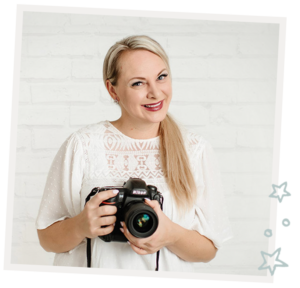
I'm
Lisa DiGeso
I’m on a mission to create uplifting online experiences for photographers ready to elevate their art, their business and their mindset.(...and have fun along the way!)















